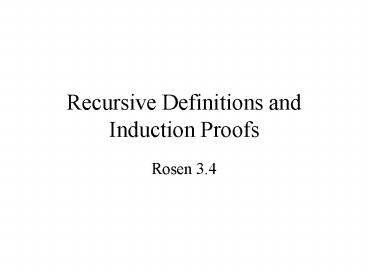Recursive Definitions and Induction Proofs - PowerPoint PPT Presentation
1 / 21
Title: Recursive Definitions and Induction Proofs
1
Recursive Definitions and Induction Proofs
- Rosen 3.4
2
More Fibonacci Numbers
Prove , for n ? 2
Basis step, for n2
3
More Fibonacci Numbers
Inductive Step Assume , for 2 ? k ? n
Show
4
More Fibonacci Numbers
5
More Fibonacci Numbers
- But we showed before that if ,
- then ? (1?5)/2 .
- More generally,
- (1?5)/2
- (1-?5)/2
- and ? is the golden ratio (often labeled f)!
6
Golden Ratio
b
a
c
Try this
Thus a gives the golden ratio.
7
Golden Ratio
- What is fn1/ fn as n gets very large?
- Recall
- (1?5)/2
- b (1-?5)/2
fn1/ fn approaches the golden ratio (a) as n
gets very large!
What happens to an and bn as n gets very large?
8
Prove that the function g(n) f1 f3
f2n-1 (where fi is a Fibonacci number) is equal
to f2n whenever n is a positive integer.
- Basis Step
- If n 1, then g(1) f21 - 1 f1 1 f2
- Inductive Step
- Assume g(k) f1 f3 f2k-1 f2k for k ?
n, we must show that this implies g(n1)
f2(n1) - g(n1) f1 f3 f2n-1 f2n1
- g(n1) g(n) f2n1
- g(n1) f2n f2n1 f2n2 f2(n1)
9
Find a closed form solution for the recursive
definition T(n) T(n/2) c1, T(1) c0where
n is 2k for k?N.
- T(1) c0
- T(2) T(1) c1 c0 c1
- T(4) T(2) c1 c0 c1 c1 c0 2c1
- T(8) T(4) c1 c0 2c1 c1 c0 3c1
- T(16) T(8) c1 c0 3c1 c1 c0 4c1
- Guess that T(n) c0 c1log2n
10
Proof of guess
- Proof by Induction.
- Basis Step T(1) c0 c1log21 c0 c10 c0
- Inductive Step Assume that T(n) c0 c1log2n,
then we must show that T(2n) c0 c1log2(2n) . - T(2n) T(n) c1
- c0 c1log2n c1
- c0 c1log2n c1log22 c0 c1(log2n log22)
- c0 c1log2(2n)
11
Ackermanns Function
- A(m,n) 2n if m 0
- 0 if m ? 1 and n 0
- 2 if m ? 1 and n 1
- A(m-1, A(m,n-1)) if m ? 1 and n ? 2
- A(1,0) 0
- A(0,1)
- A(2,2)
- A(1,1)
12
Ackermanns Function
- A(m,n) 2n if m 0
- 0 if m ? 1 and n 0
- 2 if m ? 1 and n 1
- A(m-1, A(m,n-1)) if m ? 1 and n ? 2
- A(1,0) 0
- A(0,1) 2
- A(2,2)
- A(1,1)
13
Ackermanns Function
- A(m,n) 2n if m 0
- 0 if m ? 1 and n 0
- 2 if m ? 1 and n 1
- A(m-1, A(m,n-1)) if m ? 1 and n ? 2
- A(1,0) 0
- A(0,1) 2
- A(2,2) A(1,A(2,1)) A(1,2) A(0,A(1,1))
A(0, 2) 4 - A(1,1)
14
Ackermanns Function
- A(m,n) 2n if m 0
- 0 if m ? 1 and n 0
- 2 if m ? 1 and n 1
- A(m-1, A(m,n-1)) if m ? 1 and n ? 2
- A(1,0) 0
- A(0,1) 2
- A(2,2) A(1,A(2,1)) A(1,2) A(0,A(1,1))
A(0, 2) 4 - A(1,1) 2
15
Show that A(m,2) 4 whenever m ? 1
- A(m,n) 2n if m 0
- 0 if m ? 1 and n 0
- 2 if m ? 1 and n 1
- A(m-1, A(m,n-1)) if m ? 1 and n ? 2
- Basis step When m 1, A(1,2) A(0,A(1,1))
A(0, 2) 22 4
16
Show that A(m,2) 4 whenever m ? 1
- A(m,n) 2n if m 0
- 0 if m ? 1 and n 0
- 2 if m ? 1 and n 1
- A(m-1, A(m,n-1)) if m ? 1 and n ? 2
- Inductive Step
- Assume that A(j,2) 4 for 1? j ? k. We must
show that A(k1, 2) 4. - A(k1,2) A(k,A(k1,1)) A(k,2) 4
17
When n is a positive integer, show that
- Basis step n 1, remember f0 0, f1 1, f2 1
18
When n is a positive integer, show that
- Inductive step
- Assume that
- We must show that
19
(No Transcript)
20
Prove that
- Proof
- Basis Step For n 1 we get 1/(1(11)) 1/2 for
both the sum and the closed form. - Inductive Step
- Assume that
- We must show that
21
(No Transcript)































